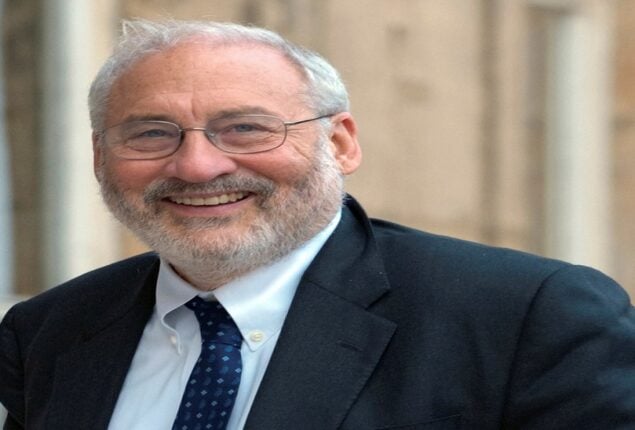Australian teenager is feared killed in Syrian prison
Yusuf Zahab, 17, died of "uncertain causes" in the Al-Sinaa jail in...

Nobel prize-winning economist Joseph Stiglitz calls for windfall profits tax in Australia (credits:google)
Tax is a “no-brainer” following the enormous profits made by businesses during Covid, but Stiglitz claims that because to corporate influence, it is “politically tough.”
In order to get a windfall gains tax passed, economist Joseph Stiglitz personally lobbied treasurer Jim Chalmers, saying that sharp increases in interest rates could trigger a “economic downturn.”
A windfall gains tax, according to Nobel Prize-winning economist Joseph Stiglitz, is a “no-brainer” that has been abandoned because of the influence of large corporations.
After personally urging the treasurer, Jim Chalmers, to enact the tax and warning that excessive interest rate increases could send Europe, the US, and eventually Australia into recession, Stiglitz made the remarks to media on a tour of Australia.
Despite a recent research from the liberal think tank Australia Institute suggesting that rising earnings are contributing to inflation, the treasurer, Jim Chalmers, once again rejected a windfall profits tax at a press conference on Monday.
A windfall gains tax, according to Stiglitz, is a “no-brainer” since the Covid epidemic resulted in “massive windfall profits” for businesses and because the Russian invasion of Ukraine raised energy costs.
He claimed that the levy would deter businesses from using “monopoly power” and persuade them not to raise prices as well as stop resource corporations with significant foreign ownership from taking money out of Australia.
According to Stiglitz, who suggested that corporations “have a lot of influence,” the windfall profits tax “looks to be politically tough for this government.”
Stiglitz also praised environmental taxes like a carbon tax in remarks to Australia Institute employees, though he acknowledged that such a tax might not be feasible in Australia. This is an apparent allusion to the bipartisan agreement that since the Coalition repealed the interim carbon price, it is not necessary to drive emissions reduction with taxes.
Despite Cormann spending years in government arguing against the concept, the Organization for Economic Co-operation and Development, directed by the former finance minister Mathias Cormann, has also urged Australia to implement a carbon pricing.
After accepting that “wages aren’t driving the inflation problem that we have in our economy,” Chalmers later told reporters that he did not foresee any additional revenue-raising measures beyond sensible adjustments to multinational tax and tax compliance.
A windfall tax is not something we are considering, we’ve made that plain, he added.
“This morning in my office, Joe Stiglitz and I had a lengthy discussion about this. On that, we’ve been quite clear about our position.
Jim Chalmers, the Treasurer, addresses the media during a press conference at Parliament House in Canberra. In his July economic report, Jim Chalmers warns of “confronting” inflation and wage projections.
After a decade of pay stagnation, Australia today has an unemployment rate of just 3.5 percent. However, with inflation expected to hit 7 percent and interest rates rising, companies and the Reserve Bank do not want wage growth to contribute to inflation.
Stiglitz cautioned that it would be “wrong” to allow workers’ wages to lag behind the rise in prices since falling real wages would “exacerbate” inequality and “wages are not really the source of the inflation” in Australia.
He told reporters in Canberra that because inflation is “centred on a few areas,” central banks should exercise caution when employing monetary policy, a “quite harsh instrument,” to address the issue.
Unemployment, according to Stiglitz, is “a primary concern,” and he cautioned: “If you raise interest rates too high and too quickly, there will almost certainly be an economic slump.”
He claimed that because Australia is in a “far more strong” position than the US, it is “not as likely to tilt into recession.”
Considering that growth was negative in the first quarter of 2022, early indications indicate it will be negative again in the second quarter, and the fourth quarter of 2021 was only positive due to an increase in inventories, Stiglitz stated that the US is “probably already” in a recession.
The possibility that Europe and the United States will overreact and cause a worldwide slowdown must be taken into consideration by Australia.
There is “no theory or proof” that 2 percent is the appropriate inflation objective, according to Stiglitz, who claimed that Australia’s lower bound inflation target of 2 percent had been “drawn out of thin air.”
According to Stiglitz, there is a “strong theory” that accepting “a somewhat higher rate of inflation if it promotes that kind of transition” during a time of significant change “makes a lot more sense.”
He forewarned that businesses would find it harder to invest while borrowing rates were high.
“We want to do everything we can to guarantee that change occurs quickly and without a loss of jobs,” the statement continued.
Catch all the International News, World News, Breaking News Event and Latest News Updates on The BOL News
Download The BOL News App to get the Daily News Update & Follow us on Google News.